|
|
|
Sort Order |
|
|
|
Items / Page
|
|
|
|
|
|
|
| Srl | Item |
| 1 |
ID:
163588
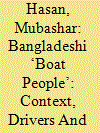

|
|
|
|
|
| Summary/Abstract |
Based on field research, this article focuses on the little-known phenomenon of Bangladeshi ‘boat people’ seeking entry to Thailand and Malaysia. It identifies how in a populous country of the Global South, familiar with various kinds of worker migration and movements of people, changing political, social and ecological contexts may generate and drive yet more manifestations of migration, also related to trafficking. In particular, certain developments in international relations connected to religious politics are shown to be instrumental in facilitating migration through legal and illegal channels. The interviews identify significant motivating factors that suggest an urgent need to develop policy recommendations, also in South Asia, to alleviate risks and suffering for irregular migrants and their families.
|
|
|
|
|
|
|
|
|
|
|
|
|
|
|
|
| 2 |
ID:
155629
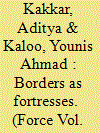

|
|
|
|
|
| Summary/Abstract |
Borders, both maritime and land, offer opportunities with regard to trade and cross-border movement of people and, at the same time, pose several challenges to a nation. The challenges include but are not limited to cross-border terrorism, illegal migration, trafficking and smuggling of arms.
|
|
|
|
|
|
|
|
|
|
|
|
|
|
|
|
| 3 |
ID:
088142
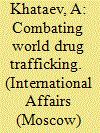

|
|
|
|
|
| Publication |
2009.
|
| Summary/Abstract |
GLOBALIZATION AND REGIONAL INTEGRATION help to erase economic distinctions between nations and continents, eliminate trade barriers and offer broad opportunities for further progress. It is unfortunate, however, that these changes in international relations and state systems are being skillfully used in drug trafficking, which has taken on transnational proportions. As a reflection of these opportunities, it is to a certain extent both a cause and an effect of important changes in global politics and economics.
A number of experts in Russia and elsewhere see many factors that help transnational drug trafficking to have such great influence on today's world.
The first factor is the political and economic instability in some countries. The organized drug-related crime weakens the protective functions of systems that form the state and government institutions and worsens the crisis in these countries through the use of considerable sums from drug trafficking for attaining political and economic objectives and through instigating and maintaining ethnic conflicts.
Furthermore, there are either no laws or there are flawed laws, or the observance of laws is not monitored while the socioeconomic problems worsen and there are corrupt officials accepting kickbacks from drug traffickers. In their attempts to keep their business and evade punishment, drug dealers stoke up corruption by funneling a large proportion of their proceeds into bribing officials, obtaining the necessary information and creating conditions for laundering the money made through drug trafficking.
|
|
|
|
|
|
|
|
|
|
|
|
|
|
|
|
| 4 |
ID:
093831
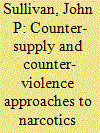

|
|
|
|
|
| Publication |
2010.
|
| Summary/Abstract |
Narcotics and the drug trade contribute to a range of social ills. Among these are social instability, violence, corruption, and a weakening of the state. A range of criminal enterprises, including transnational gangs and drug cartels are engaged in the global trade in illicit drugs. This essay looks at measures to stem this trade through interventions directed against the drug supply and efforts to limit the violence that results from the drug trade. As such it looks at 'counter-supply' and 'counter-violence' approaches. While it emphasizes the impact on the Western Hemisphere - the United States and Latin America - it has international implications for global and national security, intelligence, and law enforcement.
|
|
|
|
|
|
|
|
|
|
|
|
|
|
|
|
| 5 |
ID:
104642
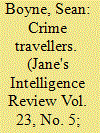

|
|
|
| 6 |
ID:
080580
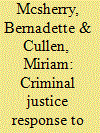

|
|
|
|
|
| Publication |
2007.
|
| Summary/Abstract |
Attempts to address the problem of trafficking in persons on an international, regional and national basis are relatively recent. The 'Bali Process' refers to an ongoing programme of practical cooperation between over 40 Asian and Pacific countries which arose out of the Regional Ministerial Conferences on People Smuggling, Trafficking in Persons and Related Transnational Crime held in Bali in February 2002 and April 2003. The Conferences, together with the United Nations' Protocol to Prevent, Suppress and Punish Trafficking in Persons, Especially Women and Children, provided the impetus for the enactment of national legislation to criminalize trafficking in persons. This article analyses the criminal justice response to trafficking persons in the Asia-Pacific region since the enactment of the Protocol and argues that there are numerous practical problems with the enforcement of new trafficking provisions. Drawing on case studies in Australia and New Zealand, it is argued that other offences may be more easily enforced and that the emphasis on enacting new offences detracts from addressing human rights issues and the social dynamics of migration.
|
|
|
|
|
|
|
|
|
|
|
|
|
|
|
|
| 7 |
ID:
076655
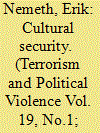

|
|
|
| 8 |
ID:
106016
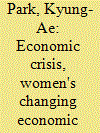

|
|
|
|
|
| Publication |
2011.
|
| Summary/Abstract |
Although many studies have analyzed the gendered impact of economic crisis, few have examined the case of North Korea. This article will explore how North Korea's economic crisis caused changes in women's economic participation. It will also analyze the impact of these new economic roles on the lives of women, and examine the broader implications of these roles for the status of women in North Korea. The North Korean economic crisis changed the pattern of women's economic participation, pulling women out of the formal labor market and driving them into the informal private economic sector. It also forced a number of women to leave their homeland in order to provide support for their own and their families' livelihoods. The new economic roles women have assumed in the wake of the food crisis have affected women's lives in many negative ways, resulting in an increase in their workloads, as well as an increase in the amount of sexual violence and stress of family breakdowns they experience. At the same time, however, these new roles have given women stronger voices in family decision-making matters and allowed them to develop, to some degree, a sense of self-consciousness and awareness of their own rights. Nevertheless, the fact that women have been engaged in new economic activities does not imply that they also have a high likelihood of advancing their socioeconomic status. To the contrary, women's defection from their homeland does not allow them to voice their opinions in matters related to the existing gender inequalities. Moreover, North Korean women are not considered capable of forming a critical mass, as they lack economic, social, political, and organizational resources to collectively voice their discontent. Furthermore, the neo-Confucian tradition of male superiority that is still firmly entrenched in the society is a major barrier that remains to be overcome.
|
|
|
|
|
|
|
|
|
|
|
|
|
|
|
|
| 9 |
ID:
167405
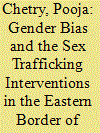

|
|
|
|
|
| Summary/Abstract |
The present article looks at gender bias and sex trafficking interventions in the eastern border of India–Nepal. It attempts to understand the socio-economic conditions and other influencing factors that circumscribe a woman’s migration. It documents the interventions by anti-trafficking networks and explores the experience of intercepted women. It attempts to show how interception methods as techniques of intervention to combat trafficking in persons are gender biased. Interception, as a primary method of intervention, is used by anti-trafficking organisations to prevent the occurrence of human trafficking cases in its origin/source country. On suspicion, a woman or a girl crossing the border alone or in all-female groups is stopped and intercepted by the anti-trafficking activists on the ground of her being a potential victim of sex trafficking. Such interception generally takes place within 3 km radius of the border of Panitanki, India, to Kakarbitta, Nepal in order to prevent the unsafe and illegal migration of girls/women. The cross-questioning method is used to extract information and validation about her identity and travel. This article, therefore, examines interception methods as techniques of intervention to combat trafficking in persons. It shows how this intervention method in certain aspect is patriarchal in its form. It reinforces the patriarchal belief of women’s vulnerability in the absence of male authority leading to discreet dangers.
|
|
|
|
|
|
|
|
|
|
|
|
|
|
|
|
| 10 |
ID:
147864
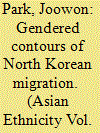

|
|
|
|
|
| Summary/Abstract |
This article examines the gendered and sexualized contours of North Korean experiences in South Korea at a time when nearly 70% of the North Korean emigrants are women. South Korean television shows – e.g. reality programs – and marriage matchmaking organizations seek to portray North Korean women in a ‘positive’ way to the South Korean public, although, as this article will illustrate, these representations are of a very particular, sexualized kind. These representations are sometimes negative, and there is stigma attached to North Korean women, in which South Koreans assume, for example, that they are victims of human trafficking or that they have had relations with Chinese men during their migration. Furthermore, poor nutrition and other forms of structural violence in North Korea have molded North Korean bodies; there are often physical disparities between North and South Koreans. In South Korean society where short height is viewed as undesirable and where idealized, surgical notions of beauty dominate, the violence of gendered phenotypical normalization mark North Korean bodies as smaller, foreign, and strange. Based on ethnographic research in South Korea, this article argues that these gendered contours of North Korean migration amount to a different sort of structural violence in South Korea.
|
|
|
|
|
|
|
|
|
|
|
|
|
|
|
|
| 11 |
ID:
000699
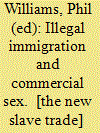

|
|
|
|
|
| Publication |
London, Frank Cass, 1999.
|
| Description |
xx,241p.
|
| Standard Number |
0714648329
|
|
|
|
|
|
|
|
|
|
|
|
Copies: C:1/I:0,R:0,Q:0
Circulation
| Accession# | Call# | Current Location | Status | Policy | Location |
| 042000 | 364.106/WIL 042000 | Main | On Shelf | General | |
|
|
|
|
| 12 |
ID:
123343
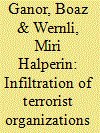

|
|
|
|
|
| Publication |
2013.
|
| Summary/Abstract |
Criminal syndicates and terrorist organizations are inherently different, one motivated by profit and the other by political goals. Yet their difference enables them to cooperate for their mutual benefit. Nowhere has this been more evident than in the drug trade; from harvesting and trafficking in illegal substances, it has been an easy transition to counterfeiting and disseminating medications. Hezbollah, in particular, has become involved in the production, smuggling and distribution of counterfeit medications in North America, Africa and the Middle East as a means of raising immense sums of money to finance its terrorist activities. Hezbollah's infiltration into the pharmaceuticals industry illustrates the danger posed by the marriage of terrorism and crime, which arises both from enhanced resources for terrorism, and from the corruption of a legitimate and necessary industry. Understanding the nature and extent of this danger is the first step in preparing to meet it.
|
|
|
|
|
|
|
|
|
|
|
|
|
|
|
|
| 13 |
ID:
173635
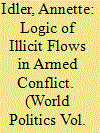

|
|
|
|
|
| Summary/Abstract |
Why is there variation in how violent nonstate groups interact in armed conflict? Where armed conflict and organized crime converge in unstable regions worldwide, these groups sometimes enter cooperative arrangements with opposing groups. Within the same unstable setting, violent nonstate groups forge stable, long-term relations with each other in some regions, engage in unstable, short-term arrangements in others, and dispute each other elsewhere. Even though such paradoxical arrangements have intensified and perpetuated war, extant theories on group interactions that focus on territory and motivations overlook their concurrent character. Challenging the literature that focuses on conflict dynamics alone, the author argues that the spatial distribution of illicit flows influences how these interactions vary. By mapping cocaine supply chain networks, the author shows that long-term arrangements prevail at production sites, whereas short-term arrangements cluster at trafficking nodes. The article demonstrates through process tracing how the logic of illicit flows produces variation in the groups’ cooperative arrangements. This multiyear, multisited study includes over six hundred interviews in and about Colombia’s remote, war-torn borderlands.
|
|
|
|
|
|
|
|
|
|
|
|
|
|
|
|
| 14 |
ID:
093825


|
|
|
|
|
| Publication |
2010.
|
| Summary/Abstract |
Today, analysts of the postmodern era recognize that worldwide conflicts are increasingly influenced by the interaction between terrorists, criminals, gangs, and private armies and that this interaction is a threat to the nation state. Now, a related threat is coming into play - one that involves all of these types of groups being represented at once in a single adversary. One such multifaceted group that is in the forefront is Los Zetas, a band of Mexican cartel enforcers that cannot be easily categorized, assessed, or targeted. Within broad categories of a multitude of irregular groups, Los Zetas embodies such capabilities as extensive compartmentalized networking, pervasive intelligence and counterintelligence capabilities, amassing of advanced weaponry, brutal tactics, top level military and police training, and the ability to undermine state governments and control large swaths of territory. Los Zetas, if left unchecked and unexamined, could potentially become a great security problem for Mexico, the US, and Central America. This essay provides an operational assessment that explores Los Zetas using various criteria traditionally used by nation state militaries, and more recently by Terrorism Early Warning Groups, to assess opposing forces (OPFOR). The purpose of this operational assessment is to provide a baseline understanding of Los Zetas that would make them less imposing and more targetable.
|
|
|
|
|
|
|
|
|
|
|
|
|
|
|
|
| 15 |
ID:
109846
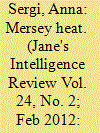

|
|
|
| 16 |
ID:
126458
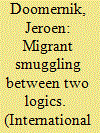

|
|
|
|
|
| Publication |
2013.
|
| Summary/Abstract |
Migration processes are driven by forces that are by their very nature difficult to address with government policies, especially when these are aimed at control and restriction. Yet, in response to domestic and international policies, governments, jointly and individually, seek to intervene forcefully in certain types of migration. Paradoxically, these interventions by and large go against the logic inherent in migration processes and thus have perverse effects: they do little to reduce migration and instead create a market for human smuggling. The thrust of current policy development is in the direction of further criminalisation. It is argued that this is not the most sensible course of action.
|
|
|
|
|
|
|
|
|
|
|
|
|
|
|
|
| 17 |
ID:
123477
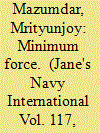

|
|
|
| 18 |
ID:
134353
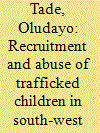

|
|
|
|
|
| Summary/Abstract |
This article examines the recruitment and transportation of internally trafficked children from Benue State in the north-central geo-political zone of Nigeria to Oyo State in the south-western zone of Nigeria. The study is essentially qualitative: with the aid of the snowball sampling technique, in-depth interviews (IDIs) were conducted with drivers, employers and trafficking agents in two recipient communities in Ibadan. The findings show that human rights abuses manifest at the recruitment, transportation and destination phases. The human rights abuses include the recruitment of underage children for domestic work outside their immediate family environments; transportation under inhumane conditions; restriction of movement at traffickers' ‘warehouses’; non-disclosure of amount payable for the services of domestic servants by agents/traffickers; exclusion of domestic servants in wage negotiations; and violence by employers. In view of these, there is a need for the National Agency for the Prohibition of Trafficking in Persons to strengthen its internal trafficking campaign.
|
|
|
|
|
|
|
|
|
|
|
|
|
|
|
|
| 19 |
ID:
133355
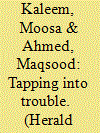

|
|
|
|
|
| Publication |
2014.
|
| Summary/Abstract |
Imagine a city that requires 1,000 million gallons of water every day and then imagine a system that, even in the best case scenario, can carry only half of that water to the city. It is inevitable that dishonest officials, unscrupulous elements, profiteers and even crime rackets see this shortage as a window of opportunity to make a quick buck. Quite naturally, those vested in its failure would like to keep the system as inadequate and inefficient as it always has been. This is Karachi and a summary of its water woes for you.
|
|
|
|
|
|
|
|
|
|
|
|
|
|
|
|
| 20 |
ID:
117955
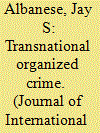

|
|
|
|
|
| Publication |
2012.
|
| Summary/Abstract |
Over the last twenty years, traditional depictions of organized crime as an ethnic, neighborhood phenomenon have given way to discoveries of emerging transnational criminal enterprises involving trafficking, fraud, and corruption on an international scale. The available evidence suggests that these are not two distinct types of criminal conduct. Instead they are overlapping in nature in terms of the crimes committed, the offenders involved, and in how criminal opportunities are exploited for profit. This article analyzes the similarities and differences between organized crime and transnational crime, concluding that they are in fact manifestations of the same underlying conduct and the same pool of criminal offenders. They involve exploitation of similar criminal opportunities, which have changed in form over time. Recommendations for more effective international prevention and responses are made in the context of assessing the remarkable transnational organized crime control efforts of the last decade.
|
|
|
|
|
|
|
|
|
|
|
|
|
|
|
|
|
|
|
|
|